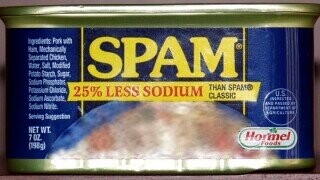From Depression to Fine Dining: The History of Spam

“Spam is underrated” is a ridiculous-sounding sentence, but it’s also true. The (not actually so) mysterious meat is literally a joke to British comedy fans, but it played an important role in global economic history, remains a treasured part of several cultures’ cuisines, and honestly tastes great fried up with some rice. Try it sometime.
The Invention of Spam

As with most modern food fads, the purpose of Spam was to trick consumers into buying the gross scraps previously left on the factory floor. Specifically, Jay Hormel really wanted to get rid of all the pork shoulder he had lying around, so he spent “a good many years” figuring out how to make it edible.
What Does “Spam” Mean?

To drum up publicity for their meat can, Hormel held a naming contest with a $100 (about $1,500) prize that ended up being won by the nephew of a former company vice president, so they apparently couldn’t even pay people to care about it. Everyone who knows what it means is either dead or not telling; Hormel himself told people it was a portmanteau of “spiced ham,” but according to the company, “the real answer is known by only a small circle of former Hormel Foods executives. And probably Nostradamus.”
Depression Meat
Luckily for Hormel and suckily for just about everyone else, Spam made its debut in 1937, when America was in the middle of a depression -- not the kind that often leads to Spam consumption today but, you know, that Great one. Under any other circumstances, the public might not have been open to such developments, but the inexpensive, non-perishable protein became a modest success in the thousand-yard stare granted by eight years of crushing poverty.
The First Jingle

In a bid to convince the Depressed hordes that Spam was not just cheap and adequate but good, actually, Hormel embarked on a massive ad campaign, complete with radio show sponsorships and what is believed to be the first commercial jingle, which consisted of the words, “Spam, spam, spam spam/Hormel’s new miracle meat in a can/Tastes fine, saves time/If you want something grand, ask for Spam,” sung to the tune of “My Bonnie Lies Over the Ocean.” The great thing about being the first of something is that you don’t have to be terribly creative.
Wartime Delicacy
World War II meant that, once again, everyone else’s loss was Spam’s gain. Its portability and long shelf life made it an ideal protein source for soldiers overseas, so Hormel shipped more than 100 million cans to Allied troops, who developed both a taste and a resentment for the meat they were fed up to three times a day. World leaders even said that winning the war wouldn’t have been possible without Spam. You thought it was D-Day, but nope. It was Spam.
The Perks of Being Irrationable

Spam was cemented in the diets of those at home as well thanks to wartime rationing. Fresh meat was rationed, but people could eat as much Spam as they wanted, an offer no doubt considered by some as more of a punishment.
Spam in Hawaii

If you’ve ever been to Hawaii, you might have been unsettled to find people chowing down Spam like tiny steaks, which likewise goes back to the days of Pearl Harbor. The government restricted fishing on Hawaii during the war, but the military’s presence on the islands made Spam readily available, so Hawaiians decided to love the one they were with.
Solving Spamine
Spam went global in World War II as well, shipped out to Britain as part of the Lend-Lease Agreement and as part of aid packages to wartorn Europe and Soviet Russia. “Without Spam, we wouldn’t have been able to feed our army,” Nikita Khrushchev later wrote. “We had lost our most fertile lands.”
The Hormel Girls

When the war ended, Hormel was concerned about its future revenue and also tangentially employment opportunities for women who found themselves suddenly jobless, so they created the Hormel Girls, a group of about 60 veterans who sang and danced their way across the country and over the radio waves promoting Spam. Yes, Spam was a musical phenomenon long before Spamalot.
Spam in South Korea

Spam similarly made its way into South Korea during the Korean War, but it was fairly expensive and inaccessible to South Koreans, earning it a reputation of luxury that persists to this day. It’s even given as gifts during holidays, but we trade Christmas Hickory Farms boxes, so it’s not like we’re less weird.
Glorious SPAM(R)

(BBC)
In 1970, Spam earned a special place in British culture with a Monty Python skit about an all-Spam restaurant, skewering the post-war glut of British Spam. Hormel was reportedly unhappy about the skit but decided to let it slide after Spam sales rose as a result. They even offered a limited edition can of Spam to the first 100 ticket buyers of the 2004 premier of Spamalot.
The Spam Email Lawsuits

Hormel was less happy about another consequence of the Monty Python skit: the use of “spam” as a term for unwanted email. They even sued several companies selling anti-spam software for using their name, which they’ve lost because very few people try to eat software.
The Great Spamcession
Spam found its niche once again during the Great Recession, with sales rising 10% in 2008, but unlike their great-grandmothers, consumers were still buying “luxury” foods, so they seemed to be using canned meat in an effort to keep things like organic vegetables in their diets. Those millennials will do anything for their avocado toast.
Spam Restaurants
This recession-forged trend of combo highbrow-lowbrow cuisine quickly spread to fine dining restaurants, which started serving Spam alongside foie gras and other fancy foods. There are even entire Spam-themed restaurants, apparently created by people who saw that Monty Python skit and didn’t get the joke.
Spam, A Lot

For a nearly century-long joke, Spam is still going strong, and not just because we’ve again fallen on hard economic times. Its sales have been hitting record highs for seven years straight, with 2021 revenues topping out at $11.4 billion. Yes, with a “B.” One out of three American homes contains at least one can of Spam, lurking, waiting to become your surprisingly satisfying hangover breakfast. Much like the email they loathe, there’s simply no escaping Spam.
Top image: Bodo Akdeniz/Wikimedia Commons